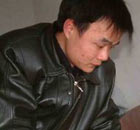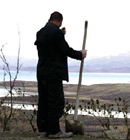-
-
China Daily E-paper
Li Xing
Water, washing machines and climate change
By Li Xing (China Daily)
Updated: 2010-01-21 06:50
 |
Large Medium Small |
Since late December, I've been watching TV reports from Ningxia and Shaanxi in the northwest, as well as Guizhou and Guangxi in the south, showing farmers enjoying the benefits of clean tap water.
Thanks to the national clean water project, millions of rural people are now able to wash their faces and their vegetables by simply turning a spigot. Clearly, clean tap water has improved their lives. In Zhongyuan village in Guizhou, farmers had to spend hours fetching water from a mountainous area miles away from home.
Nationwide, the clean water project has saved an average rural household an astounding 53 days per year. Freed from the drudgery of hauling water, rural people are now able to spend more time on productive work, either at home or in nearby cities. Even where farmers did not haul water themselves, the project has changed their lives. In Ningxia, it has saved rural families an average of 300 yuan a year, money they once spent on water.
Easy access to clean water also helps stimulate economic growth.
On China Central Television Tuesday morning, I heard Tan Qiubao, a farmer in Liujiang county, Guangxi province, tell a TV reporter that some families in his village had bought washing machines. Tan's story is being repeated in villages everywhere. As rural families gain access to clean tap water, many of them have installed showers and bought washing machines.
Washing machines are nearly universal in urban areas now; according to the National Bureau of Statistics, there were 96.8 of them for every 100 urban families by the end of 2007. But even that is a recent development.
Our family got its first washing machine in 1986. I remember hand-washing sheets when I was 13. "You're a big girl now," my father told me. In rural areas, there are only 45.9 washing machines for every 100 households. If another 30 percent of the 200 million rural families in China can now afford one, we will need to produce 60 million washing machines.
This demand will not only keep manufacturers busy, but also create jobs for people selling, delivering, and repairing the new appliances. However, we must consider the flip side of the coin: millions more washing machines will inevitably increase energy consumption.
Per capita, we Chinese consume only one-fourth of the energy Americans do. According to a 2005 survey by the US Department of Energy, about 80 percent of residential energy use in the US is consumed in single-family homes, 92 percent of which have both a clothes washer and a dryer.
While most Chinese use only cold water, many Americans use warm or even hot water to wash clothes. Some experts say that heating the water consumes more than 90 percent of the energy necessary to wash a load of clothes. And while most Chinese families hang the clean clothes out to dry, Americans routinely toss them in the dryer. Typically, this consumes about 1,079 kilowatt-hours of electricity a year, about the amount of electricity a family of three in Beijing consumes in six months.
Still, we cannot ignore the fact that per capita energy consumption in China is slowly rising above the world average. Increasing energy consumption adds greenhouse gas emissions. However slight the increase may be per capita, a rise in greenhouse gas emissions by the largest population on earth is bad news for global warming. This is not to say that farmers in Guizhou should go back to hauling their own water.
We are all entitled to a reasonable standard of living, even if that means increasing our energy consumption. However, we also have a duty to our children and to our planet to limit energy use and cut greenhouse gas emissions.
The answer to this conundrum is better technology. More efficient electrical appliances can provide convenience without a huge increase in energy consumption. Better insulation can cut heating costs, while geothermal cooling can limit the use of air conditioning.
We must not expect this technology to introduce itself, however. Energy efficiency standards must accompany progress every step of the way. If it does not, bringing clean tap water to rural areas may not be as great a blessing as it at first appears.
E-mail: lixing@chinadaily.com.cn









